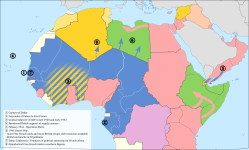LSCatilina
Never Forget Avaricon
- Location
- Albi
- Pronouns
- ēs/xsi
What would be the consequences if Franco-British forces managed to successful complete their objectives in Dakar?
Let's say the Free French forces are able to take Rufisque and then advance west until securing Dakar, De Gaulle being convinced that fighting against French and colonial troops stationed there was unavoidable.
There would have been pretty likely immediate consequences, such as providing the Royal Navy with a strong port in African mid-atlantic more easily cutting down German raids on supply lines, as well as giving Free France access to the gold reserves of the Banque de France (with the implications about buying materials from Americans) from one hand and giving De Gaulle a much needed credibility internationally and among inner networks.
In addition of taking a strong naval base in Mid-Atlantic and the gold reserves of the Banque de France (with all that implies with Free French capacity of buying material from Americans), what could have been obtained there? Would Free French be able to gain a battleship with the Richelieu and cruisers out of the battle or would have these been too damaged and/or unmanned?
Furthermore, I think Hitler would have lost a lot of interest going "soft" on Vichy as its capacity to hold on the French colonial empire would have been demonstratively unable to fully do so and thus a good part of its raison d'être gone? Would Germans decide the Armistice fleet couldn't be fully trusted and try to take it over earlier?
(In fact the only clearly implausible consequence as far as I can tell would be Vichy militarily committing along Germany, giving that's something that was proposed IOTL and immediately refused, giving Hitler rejected any idea of rearming France.)
Would other colonial territories more prone to switch to a Dakar-based Free France such as Gabon without going trough the IOTL campaign, in spite of the still very recent consequences of Mers-El-Kebir?
What of the consequences on a North African front ITTL?
Let's say the Free French forces are able to take Rufisque and then advance west until securing Dakar, De Gaulle being convinced that fighting against French and colonial troops stationed there was unavoidable.
There would have been pretty likely immediate consequences, such as providing the Royal Navy with a strong port in African mid-atlantic more easily cutting down German raids on supply lines, as well as giving Free France access to the gold reserves of the Banque de France (with the implications about buying materials from Americans) from one hand and giving De Gaulle a much needed credibility internationally and among inner networks.
In addition of taking a strong naval base in Mid-Atlantic and the gold reserves of the Banque de France (with all that implies with Free French capacity of buying material from Americans), what could have been obtained there? Would Free French be able to gain a battleship with the Richelieu and cruisers out of the battle or would have these been too damaged and/or unmanned?
Furthermore, I think Hitler would have lost a lot of interest going "soft" on Vichy as its capacity to hold on the French colonial empire would have been demonstratively unable to fully do so and thus a good part of its raison d'être gone? Would Germans decide the Armistice fleet couldn't be fully trusted and try to take it over earlier?
(In fact the only clearly implausible consequence as far as I can tell would be Vichy militarily committing along Germany, giving that's something that was proposed IOTL and immediately refused, giving Hitler rejected any idea of rearming France.)
Would other colonial territories more prone to switch to a Dakar-based Free France such as Gabon without going trough the IOTL campaign, in spite of the still very recent consequences of Mers-El-Kebir?
What of the consequences on a North African front ITTL?


